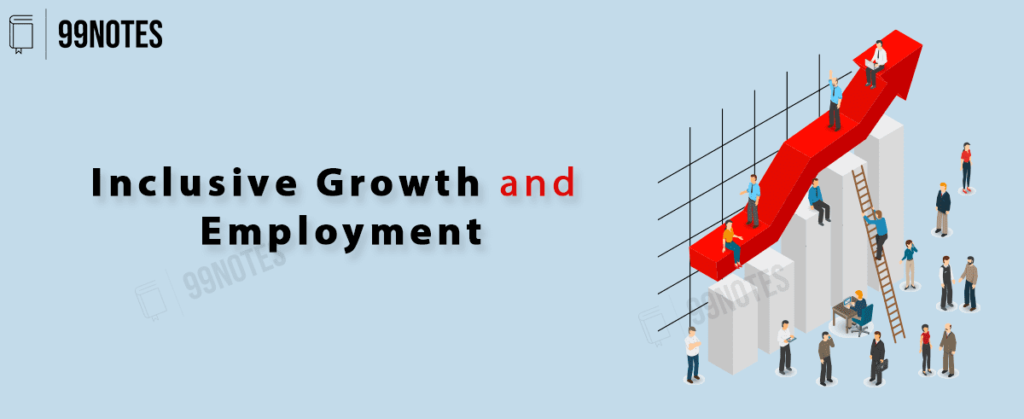
Inclusive Growth and Employment Free UPSC Notes Download
Inclusive Growth and Employment
Inclusive growth and Employment
Inclusive growth and employment are important topics that may be covered in the Civil Services Exam (CSE) in India. Inclusive growth refers to economic growth that is distributed fairly across different segments of society and promotes the welfare of all citizens, including disadvantaged and marginalized groups. Employment refers to the availability of paid work and the ability of individuals to secure and maintain employment.
In the CSE, candidates may be tested on their knowledge of the concepts of inclusive growth and employment, as well as the policies and initiatives that the government has implemented to promote these goals. This may include understanding the factors that contribute to inclusive growth and employment, such as economic development, infrastructure, education, and skill development, as well as the role of the government in addressing unemployment and promoting job creation.
Candidates may also be expected to analyze and interpret data and information related to inclusive growth and employment in India, and to be able to discuss the challenges and issues facing the country in these areas. To prepare for the CSE, it may be helpful to familiarize oneself with the relevant subject matter, stay current on developments in the economy and labor market, and have a basic understanding of economics and public policy.
Elements of Inclusive Growth
- Skill Development
The employability, health, education, vocational training, and skills of the working-age population will all play a part in reaping the demographic dividend. Here, the development of skills is vital.
In terms of skill development, India has two impediments:
- There is a dearth of highly qualified labourers.
- There is a dearth of work alternatives for adolescents with conventional education.
According to the 2017 Economic Survey, around 30 percent of India’s youth are unemployed (Not in education, employment or training).
UNICEF predicts that by 2030, at least 47 percent of Indian adolescents would lack the education and skills necessary for work.
Financial Inclusion
Financial inclusion is the practise of enabling low-cost access to financial services for marginalised communities.
- Financial inclusion is necessary for inclusive growth because it fosters a culture of saving, which initiates a virtuous cycle of economic development.
Technological Progress
The fourth industrial revolution is soon approaching the planet. Depending on how they are applied, these technological advances have the potential to either lessen or exacerbate inequality.
- The government has undertaken a number of efforts, such as the Digital India Mission, to guarantee that a technologically savvy populace can utilise the boundless possibilities of technology.
Additionally, technology may aid in the fight against challenges such as:
- Agriculture – Modern technology may enhance the efficiency and competitiveness of a farmer-to-consumer agro-value chain.
- Manufacturing – Technology may manage challenges such as funding, collecting raw materials, purchasing land, and developing user market links. GST was only feasible because of advanced technology.
- Education – Innovative digital technologies that enable access to trainers and mentors as well as real-time delivery of pertinent data can be used to develop new forms of adaptive and peer learning.
- Health-related technology have the potential to transform the delivery of public health services.
- Governance – Technology has the ability to eliminate public service delivery delays, corruption, and inefficiency.
Economic Expansion
India is one of the fastest-growing major economies in the world. Nevertheless, the Indian economy is now decelerating due to cyclical and structural factors.
However, India’s ambition of achieving a $5 trillion GDP by 2024-25 can assist the nation reduce inequality, increase social expenditure, and offer employment for everybody.
Social Development
- It involves empowering all marginalised groups, including SC/ST/OBC/Minorities, women, and transgender individuals.
- By enhancing social institutions such as hospitals, particularly in rural areas, schools, and universities, empowerment can be attained.
- Investing in social infrastructure would not only improve the economy (through fiscal stimulus), but also develop a healthy and competent workforce for the future.
Obstacles to Attaining Inclusive Growth
- Poverty
According to the 2018 Multidimensional Poverty Index (MPI), India lifted 271 million people out of poverty between 2005-06 and 2015-16, with the biggest reductions occurring in the poorest areas, groups, and children. At the subnational level, India has the most pronounced pro-poverty trend.
- Despite the tremendous progress, 373 million Indians continue to live in extreme poverty.
- In addition, 8.8% of the population lives in severe multidimensional poverty, while 19.3% is at risk of multidimensional poverty.
- Unemployment
The urban unemployment rate according to the NSSO’s Periodic Labour Force Survey (PLFS) was 7.8 percent, while the rural unemployment rate was 5.3 percent, bringing the overall unemployment rate to 6.1 percent.
- Due to illiteracy and an overreliance on agriculture, both the quality and quantity of jobs in India are low.
- Because more than 80 percent of persons work in the informal sector and are not protected by social security, the absence of quality employment is a worry.
- Agriculture Backwardness
Despite accounting for only 16.5% of India’s GDP, agriculture employs over 44% of the population, resulting in widespread poverty.
The following are some agricultural concerns:
- Per capita land availability is diminishing.
- A progressive decline in the employment rate.
- Low labour productivity.
- Climate change, soil degradation, and water shortages are causing a decline in agricultural productivity.
- Differences in regional and crop development
India’s Initiatives to Achieve Inclusive Growth
- The government is implementing the following initiatives to ensure equitable economic growth:
- Scheme under the Mahatma Gandhi National Rural Employment Guarantee Act (MGNREGA)
- The Prime Minister’s Employment Creation Plan (PMEGP)
- Mudra Bank scheme
- Deen Dayal Upadhyaya Grameen Kaushalya Yojana (DDU-GKY)
- Deendayal Antyodaya Yojana
- National Mission for Urban Livelihoods (DAY-NULM)
- Sarva Siksha Abhiyan (SSA)
- National Mission for Rural Health (NRHM)
It is also important for the government to prioritize employment generation, particularly for youth and women, in order to reduce poverty and inequality. This can be achieved through investments in infrastructure, education, and skill development, as well as the promotion of entrepreneurship and small businesses.
Furthermore, the government should implement policies and programs that aim to improve the quality of jobs and working conditions, and ensure that workers have access to social protections such as healthcare and pensions. This will not only improve the well-being of individuals, but also contribute to the overall development and prosperity of the country.
In conclusion, inclusive growth and employment are crucial for improving the lives of people in India and achieving sustainable development. The government and other stakeholders should prioritize these goals and take steps to address the challenges and issues facing the country in these areas.

